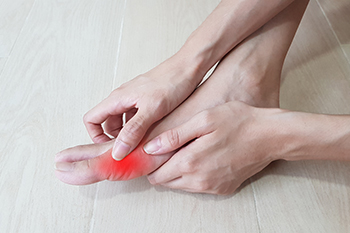
Gout is a painful arthritis caused by uric acid buildup in the body, leading to joint redness, tenderness, and severe pain. It commonly affects the feet and specifically the big toe, but can impact other joints, like the ankles, elbows, wrists, fingers, and knees. Symptoms include intense joint pain, joint inflammation, and limited range of movement. Gout is typically more common in individuals with high levels of uric acid in their bodies. Several factors contribute to this condition, including obesity, family history of gout, being male, consuming foods higher in purines, and specific medical conditions like untreated high blood pressure, diabetes, and heart and kidney diseases. Diagnosing gout involves a physical examination and may include tests such as uric acid blood tests and joint aspiration to check for urate crystals. Adopting a healthy diet, maintaining a proper body weight to prevent obesity, and making lifestyle changes like reducing alcohol and sweetened beverage consumption can be beneficial in managing gout effectively. If you suspect you have gout, it is strongly suggested that you make an appointment with a podiatrist for a proper diagnosis and treatment.
Gout is a painful condition that can be treated. If you are seeking treatment, contact Stephanie Tine, DPM from Flamingo Foot and Ankle. Our doctor will treat your foot and ankle needs.
What Is Gout?
Gout is a form of arthritis that is characterized by sudden, severe attacks of pain, redness, and tenderness in the joints. The condition usually affects the joint at the base of the big toe. A gout attack can occur at any random time, such as the middle of the night while you are asleep.
Symptoms
- Intense Joint Pain - Usually around the large joint of your big toe, and it most severe within the first four to twelve hours
- Lingering Discomfort - Joint discomfort may last from a few days to a few weeks
- Inflammation and Redness -Affected joints may become swollen, tender, warm and red
- Limited Range of Motion - May experience a decrease in joint mobility
Risk Factors
- Genetics - If family members have gout, you’re more likely to have it
- Medications - Diuretic medications can raise uric acid levels
- Gender/Age - Gout is more common in men until the age of 60. It is believed that estrogen protects women until that point
- Diet - Eating red meat and shellfish increases your risk
- Alcohol - Having more than two alcoholic drinks per day increases your risk
- Obesity - Obese people are at a higher risk for gout
Prior to visiting your podiatrist to receive treatment for gout, there are a few things you should do beforehand. If you have gout you should write down your symptoms--including when they started and how often you experience them, important medical information you may have, and any questions you may have. Writing down these three things will help your podiatrist in assessing your specific situation so that he or she may provide the best route of treatment for you.
If you have any questions, please feel free to contact our office located in Fort Lauderdale, FL . We offer the newest diagnostic and treatment technologies for all your foot care needs.